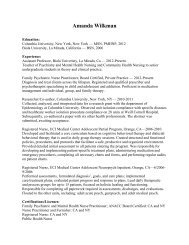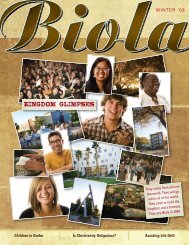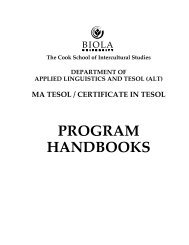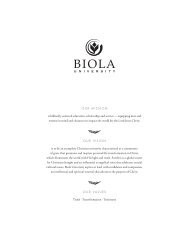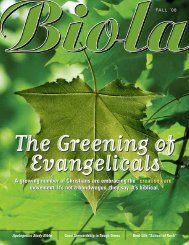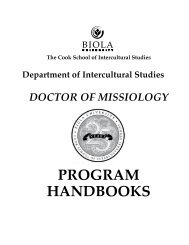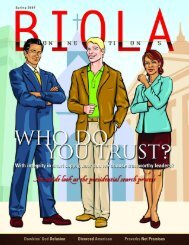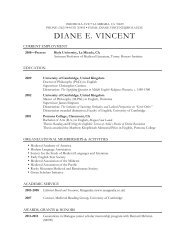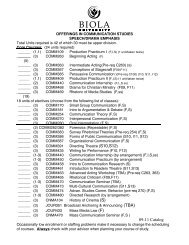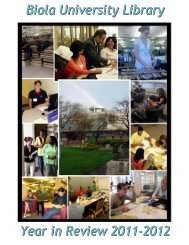A Christian Response to SB 48 - Biola University
A Christian Response to SB 48 - Biola University
A Christian Response to SB 48 - Biola University
Create successful ePaper yourself
Turn your PDF publications into a flip-book with our unique Google optimized e-Paper software.
includes sinners like you and me. He loved the person and abhorred the sin. In many instances,<br />
those who claim <strong>to</strong> be followers of Christ have used harsh, and even violent, words and actions<br />
against gay, lesbians, and transgender individuals, rather than embracing the individual as a<br />
contributing member of the community. As someone who claims <strong>to</strong> be a follower of Christ, we<br />
are mandated <strong>to</strong> love. LGBT individuals are members of our community that we want <strong>to</strong> bring <strong>to</strong><br />
Christ, not alienate by hatred. Loving our neighbor translates <strong>to</strong> embracing all students, parents,<br />
and colleagues as full members of our school communities. We can love individuals while not<br />
condoning their lifestyles. <strong>SB</strong> <strong>48</strong> is, in part, a cry against cruelty and hatred and a cry for<br />
acceptance and acknowledgment of accomplishments of this group of American citizens. Ask<br />
yourself these questions:<br />
1. Do I love my neighbor?<br />
2. Do I work <strong>to</strong> build relationships with my neighbor?<br />
3. Do I embrace all members of my community?<br />
4. Will I allow the Holy Spirit <strong>to</strong> fill me with His love, regardless of the circumstances?<br />
LGBT Lifestyles and Concomitant Concerns<br />
Lesbian, gay, bisexual and transgender (LGBT) lifestyles have documented evidence of<br />
potential health concerns, such as HIV, STDs, and cancer that can lead <strong>to</strong> premature death of<br />
otherwise healthy, gifted individuals (Allison, 2011). To promote a lifestyle with such potentially<br />
negative consequences, even without explicit moral or ethical or biblical concerns (the true<br />
litmus test), contradicts the end goals of public health education and is detrimental <strong>to</strong> our K-12<br />
student population.<br />
Social and emotional alienation can also occur in non-traditional family structures headed by<br />
LGBT individuals or in LGBT students prone <strong>to</strong> depression and anxiety (Allison, 2011). Here is<br />
where you can definitely intervene <strong>to</strong> help right the situation.<br />
Ask yourself these questions:<br />
1. If I see an LGBT youth or parent mistreated, do I step in <strong>to</strong> right the situation?<br />
2. Am I just as sensitive <strong>to</strong> the social and emotional needs of the child from a LGBT<br />
household or orientation as I am <strong>to</strong> my other students?<br />
3. Do I love my LBGT parents and students?<br />
4. Do I support healthy lifestyles? Am I reporting the facts correctly and without bias?<br />
Your <strong>Response</strong> <strong>to</strong> <strong>SB</strong> <strong>48</strong><br />
While <strong>SB</strong> <strong>48</strong> may be a response <strong>to</strong> repeated abuses of those who choose alternative lifestyles,<br />
you, the public school classroom teacher, need <strong>to</strong> decide how <strong>to</strong> take action. Inaction is action.<br />
Inaction has led <strong>to</strong> the bill slipping through the Assembly and Senate and being signed by the<br />
Governor. Authored by Sena<strong>to</strong>r Mark Leno of San Francisco, <strong>SB</strong> <strong>48</strong> was introduced December<br />
13, 2010 and signed by our California Governor Jerry Brown on July 14, 201l. In the intervening<br />
stages, <strong>SB</strong> <strong>48</strong> was passed by the Senate Education Committee in March 2011 (6-3 vote), passed<br />
by the Senate Judiciary Committee in April 2011 (3-2 vote), passed by the California Senate in<br />
April 2011 (23-14 vote), passed by the Assembly Committee on Education in June 2011 (6-2<br />
vote), and passed by the full Assembly in July 2011 (49-25 vote) (California State Senate, 2011;



